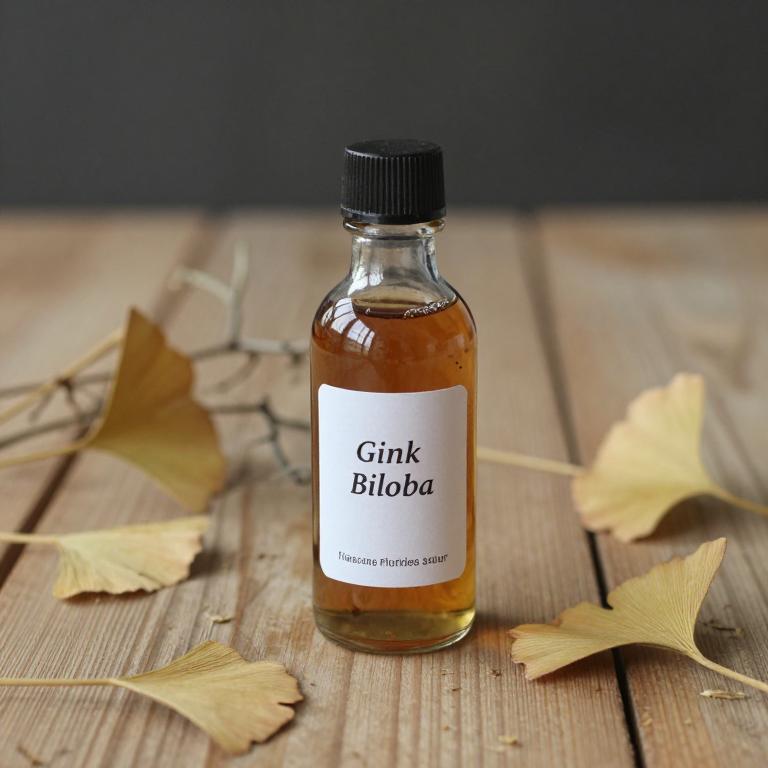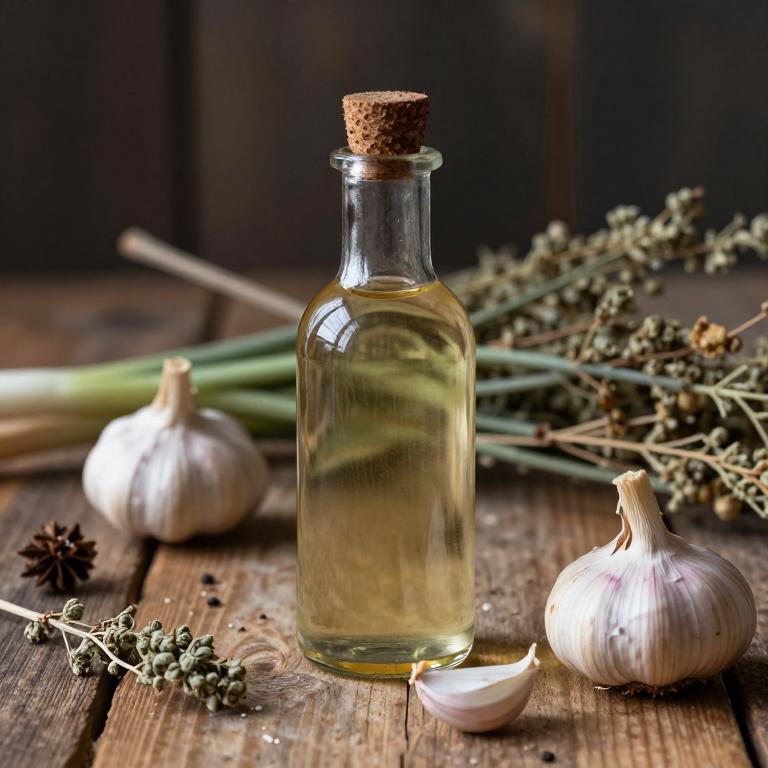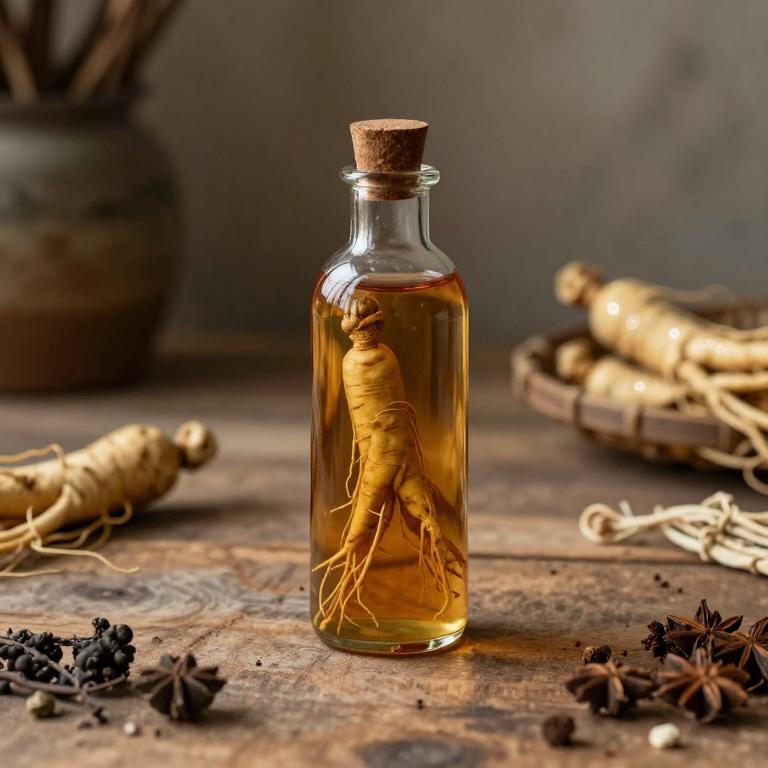10 Best Herbal Syrups For Arteriosclerosis

Herbal syrups have gained attention as potential complementary therapies for managing arteriosclerosis, a condition characterized by the hardening and narrowing of arteries.
These syrups often contain ingredients like garlic, ginger, and turmeric, which are known for their anti-inflammatory and antioxidant properties. Some studies suggest that certain herbs may help reduce cholesterol levels and improve blood flow, potentially slowing the progression of arterial plaque buildup. However, while some herbal syrups may offer supportive benefits, they should not replace conventional medical treatments prescribed by healthcare professionals.
It is important for individuals to consult with a doctor before using any herbal supplements to ensure safety and effectiveness in their specific health context.
Table of Contents
- 1. Ginkgo (Ginkgo biloba)
- 2. Salvia (Salvia officinalis)
- 3. Common grape (Vitis vinifera)
- 4. Ginger (Zingiber officinale)
- 5. Stinging nettle (Urtica dioica)
- 6. Thistle (Silybum marianum)
- 7. Turmeric (Curcuma longa)
- 8. St. john's wort (Hypericum perforatum)
- 9. Garlic (Allium sativum)
- 10. Panax ginseng (Panax ginseng)
1. Ginkgo (Ginkgo biloba)

Ginkgo biloba herbal syrups are traditionally used to support cardiovascular health due to their potential ability to improve blood circulation and reduce oxidative stress.
These syrups contain bioactive compounds such as flavonoids and terpene lactones, which are believed to enhance blood flow and protect against arterial damage. Some studies suggest that ginkgo biloba may help in reducing the risk factors associated with arteriosclerosis by preventing the buildup of plaque in the arteries. However, while preliminary research is promising, more rigorous clinical trials are needed to confirm its efficacy in treating or preventing arteriosclerosis.
As with any herbal remedy, it is important to consult a healthcare professional before use, especially for individuals with existing cardiovascular conditions.
2. Salvia (Salvia officinalis)

Salvia officinalis, commonly known as sage, has been traditionally used for its medicinal properties, and recent studies suggest that its herbal syrups may offer potential benefits in the management of arteriosclerosis.
The active compounds in sage, such as rosmarinic acid and flavonoids, have demonstrated antioxidant and anti-inflammatory effects, which may help reduce oxidative stress and inflammation—key contributors to arterial plaque formation. Some preliminary research indicates that sage syrup could improve vascular function and lower LDL cholesterol levels, both of which are critical in preventing arterial hardening. However, more clinical trials are needed to confirm its efficacy and safety in treating arteriosclerosis.
Despite these promising findings, sage syrup should not replace conventional medical treatments but may serve as a complementary therapy under professional supervision.
3. Common grape (Vitis vinifera)

Vitis vinifera, commonly known as the grapevine, has been traditionally used in herbal medicine for its potential cardiovascular benefits.
Herbal syrups derived from Vitis vinifera, particularly those containing resveratrol, are being explored for their role in managing arteriosclerosis by reducing oxidative stress and inflammation. These syrups may help improve endothelial function and inhibit the buildup of plaque in arterial walls. Preliminary studies suggest that regular consumption of Vitis vinifera herbal syrups could support heart health, though more clinical research is needed to confirm their efficacy and safety.
As a complementary therapy, these syrups may offer a natural approach to supporting arterial health when used alongside conventional treatments.
4. Ginger (Zingiber officinale)

Zingiber officinale, commonly known as ginger, has been traditionally used for its medicinal properties, and recent research suggests that ginger herbal syrups may offer potential benefits in the management of arteriosclerosis.
The active compounds in ginger, such as gingerols and shogaols, possess anti-inflammatory and antioxidant properties that may help reduce oxidative stress and inflammation, both of which are key contributors to arterial plaque formation. Studies have indicated that regular consumption of ginger syrup may support cardiovascular health by improving blood circulation and reducing cholesterol levels. While more clinical trials are needed to confirm these effects, ginger syrup is often considered a natural supplement that may complement conventional treatments for arteriosclerosis.
As with any herbal remedy, it is important to consult with a healthcare provider before incorporating ginger syrup into a treatment plan for cardiovascular conditions.
5. Stinging nettle (Urtica dioica)

Urtica dioica, commonly known as stinging nettle, has been explored for its potential therapeutic effects in herbal syrups aimed at supporting cardiovascular health, particularly in the context of arteriosclerosis.
The plant contains bioactive compounds such as flavonoids, polyphenols, and minerals that may help reduce oxidative stress and inflammation, both of which are key contributors to arterial damage. Herbal syrups made from Urtica dioica are often used to support circulation and may help in maintaining the elasticity of blood vessels. While preliminary research suggests possible benefits, more clinical studies are needed to establish their efficacy and safety in treating arteriosclerosis.
As with any herbal remedy, it is important to consult a healthcare professional before incorporating Urtica dioica syrups into a treatment regimen.
6. Thistle (Silybum marianum)

Silybum marianum, also known as milk thistle, is a herbal remedy that has been studied for its potential benefits in supporting liver health and reducing inflammation.
Herbal syrups derived from Silybum marianum contain silymarin, a group of flavonoids known for their antioxidant and anti-inflammatory properties. These syrups may help in reducing oxidative stress, which is a key factor in the development of arteriosclerosis by damaging arterial walls and promoting plaque formation. While some preliminary research suggests that silymarin may support cardiovascular health, more clinical studies are needed to confirm its efficacy in treating or preventing arteriosclerosis.
As with any supplement, it is important to consult with a healthcare professional before using Silybum marianum syrup, especially for individuals with existing cardiovascular conditions.
7. Turmeric (Curcuma longa)

Curcuma longa, commonly known as turmeric, contains curcumin, a bioactive compound with potent anti-inflammatory and antioxidant properties.
Herbal syrups made from Curcuma longa have been explored for their potential benefits in managing arteriosclerosis, a condition characterized by the hardening and narrowing of arteries. These syrups may help reduce oxidative stress and inflammation, which are key contributors to the progression of arterial plaque. However, while some preliminary studies suggest a positive effect, more clinical research is needed to establish their efficacy and safety in treating arteriosclerosis.
As with any herbal remedy, it is important to consult a healthcare professional before incorporating Curcuma longa syrups into a treatment plan.
8. St. john's wort (Hypericum perforatum)

Hypericum perforatum, commonly known as St. John's Wort, is traditionally used for its antidepressant properties, but recent research suggests it may also offer benefits in the context of arteriosclerosis.
Some studies indicate that the active compounds in hypericum perforatum, such as hypericin and hyperforin, may help reduce oxidative stress and inflammation, which are key factors in the development of arterial plaque. Herbal syrups made from hypericum perforatum are being explored as complementary therapies to support cardiovascular health by potentially improving blood flow and reducing arterial stiffness. While more clinical trials are needed to confirm its efficacy, preliminary findings suggest that hypericum perforatum may play a supportive role in the management of arteriosclerosis.
As with any herbal remedy, it is important to consult a healthcare professional before use, especially since it can interact with certain medications.
9. Garlic (Allium sativum)

Allium sativum, commonly known as garlic, has been traditionally used for its potential cardiovascular benefits, and garlic-based herbal syrups have gained attention for their possible role in managing arteriosclerosis.
These syrups are often formulated with concentrated garlic extracts and may contain additional herbs that support vascular health. Preliminary studies suggest that allicin, a key compound in garlic, may help reduce oxidative stress and inflammation, both of which are linked to the development of arteriosclerosis. However, while some research indicates promising effects, more clinical trials are needed to establish their efficacy and safety in treating this condition.
As with any herbal remedy, it is important to consult a healthcare professional before incorporating garlic syrups into a treatment plan for arteriosclerosis.
10. Panax ginseng (Panax ginseng)

Panax ginseng, a traditional herbal remedy, has been studied for its potential benefits in improving cardiovascular health, particularly in relation to arteriosclerosis.
Some research suggests that the active compounds in ginseng, such as ginsenosides, may help reduce oxidative stress and inflammation, which are key factors in the development of arterial plaque. Herbal syrups made from Panax ginseng are often used as dietary supplements to support overall circulatory function and may contribute to maintaining healthy blood vessel elasticity. While preliminary studies show promise, more clinical trials are needed to confirm its efficacy and safety in treating arteriosclerosis.
As with any herbal supplement, it is important to consult a healthcare professional before incorporating Panax ginseng syrup into a treatment regimen for cardiovascular conditions.